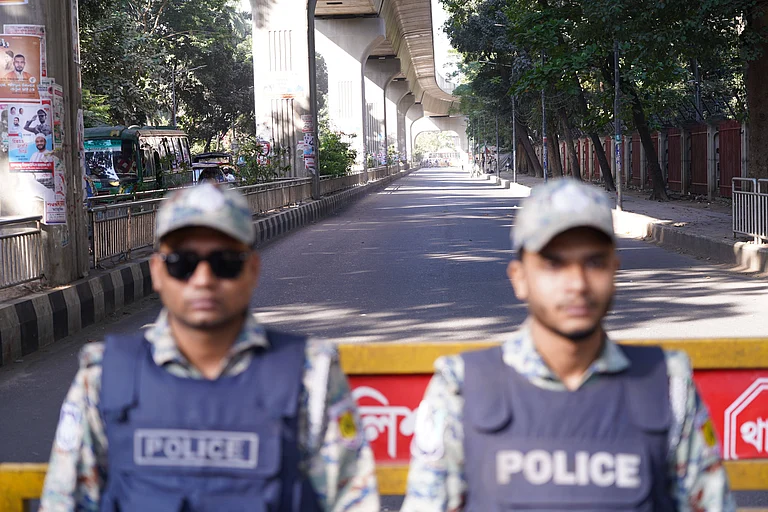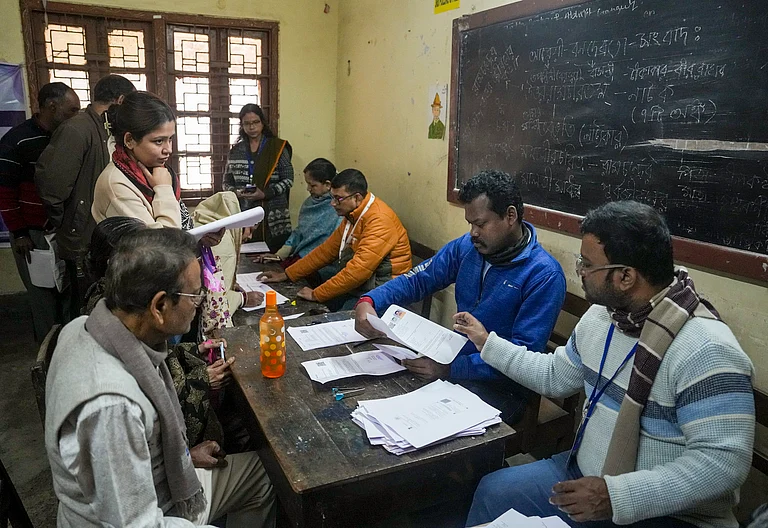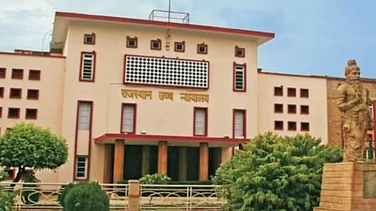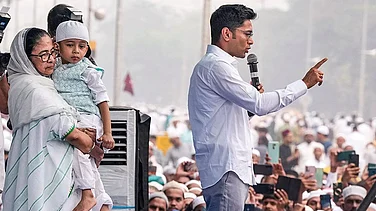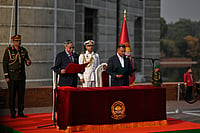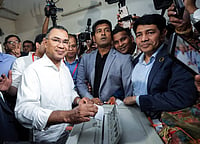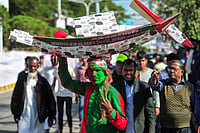In November 2023, Mamata Banerjee—West Bengal Chief Minister and Trinamool Congress (TMC) chairperson— indirectly criticised Prime Minister Narendra Modi, stating she doesn’t seek publicity by naming stadiums after herself. Her barb was an obvious reference to the recent renaming of the Motera Stadium in Ahmedabad to the Narendra Modi Stadium.
At the time, perhaps, she was not aware that one of her party’s district-level leaders—Sheikh Shahjahan of Sandeshkhali in the Sundarban region, bordering Bangladesh—had also, in some ways, emulated Modi, albeit on a smaller scale. Shahjahan had renamed the Aurobindo Mission Ground as the Sheikh Shahjahan Fan Club, after usurping its control. The heavyweight had also named a two-story market complex in the area after himself.
The Sheikh Shahjahan Market in Sarberia stands as a testimony to his might, even as the ‘Badshah’ of Sandeshkhali has now found himself in police custody—first the state Crime Investigation Department (CID) and then the Central Bureau of Investigation (CBI). The administration gave possession of the ground back to the Aurobindo Mission as well as many other land plots that had been forcefully occupied by Shahjahan. But not before the issue snowballed and attracted the attention of PM Modi and the BJP, which is now leveraging the issue ahead of the 2024 Lok Sabha polls.
“Whatever happened in Sandeshkhali will put anyone to shame, but the TMC government does not care about your issues,” Modi said on March 6 while addressing a public rally in Barasat in North 24 Parganas, the same district where Sandeshkhali is located. Several women from Sandeshkhali met the PM and narrated their ordeals to him.
The TMC suspended Shahjahan from the party only after his arrest on February 29, after he absconded for 55 days since the January 5 incident, that first catapulted Sandeshkhali into national headlines. That day, a team of Enforcement Directorate (ED) officials came under attack from Shahjahan’s associates while trying to raid his residence in connection with a scam in the public distribution system.
At the time of his arrest, Shahjahan was the fisheries in charge of North 24 Parganas zilla parishad (district council) and TMC’s Sandeshkhali I block unit president, while his right-hand, Shibaprasad Hazra, was the president of the party’s Sandeshkhali II block unit. These two community development blocks make up the Sandeshkhali assembly seat.
It can spell doom for the party if people in other places start identifying with Sandeshkhali, a possibility that cannot be ruled out given the abundance of charges.
Shahjahan switched over from the CPI (M) to the TMC towards the end of 2016, a few months after the TMC wrested the Sandeshkhali assembly seat from the CPI (M). If locals are to be believed, the local TMC MLA, Sukumar Mahata, had to soon get accustomed to taking his orders from Shahjahan, as he became the last word in the whole of Sandeshkhali.
In the first week of February, as Shahjahan remained in hiding for a month, the voices of dissenters started getting louder. For a week from February 7, Shahjahan’s close associates, like Hazra, Sushanta alias Uttam Sardar, and Ajit Maiti, among others—started facing public fury. Hundreds of women hit the streets, chased TMC leaders away, gheraoed their houses and vandalised properties.
The list of charges was long—land-grab, forceful conversion of farmland into fisheries, non-payment of fishery lease money, beating up people and taking illegal cuts from people’s entitlements under various schemes. While several women complained of sexual harassment and molestation, two women have accused Hazra, Sardar and two of their associates of raping them. It is the allegations of sexual harassment that the BJP highlighted the most, but, on the ground, the greatest cause of public anger was economic exploitation.
The intensity of the protests forced the district administration to open special camps to collect public complaints against local TMC leaders. They started handing over possession of the grabbed land back to their original owners. By February 27, according to the TMC’s mouthpiece, the daily, Jago Bangla, at least 239 persons were given back possession of their land that local TMC leaders had forcefully occupied, exposing the scale of high-handedness and lawlessness that prevailed over Sandeshkhali. The nature of complaints against Shahjahan and his clique is not peculiar to Sandeshkhali and illegal cuts, which, in colloquial lingo, are referred to as cut money, are prevalent in other parts of Bengal.
In 2019, after facing a setback in the Lok Sabha elections, the chief minister took potshots at her party leaders for making it a habit of taking cuts from people’s entitlements. She also asked them, during a meeting broadcast live on social media and TV channels, to “return” whatever illegal cuts they had taken from people in exchange for helping them get their rightful entitlements. Her message had an unintentional impact—people in many villages started thronging TMC leaders’ homes, demanding that they obey the chief minister and return whatever cuts they had taken.
Sensing the widespread extent of the problem, the government first launched a special cell at the chief minister’s office to receive such complaints and later the party launched the Didike Bolo programme. They were flooded with complaints of similar patterns—cut money, land grab, extortion and filling of ponds. When MPs, MLAs, block and panchayat level leaders had to visit their constituencies as part of the campaign and spend nights with locals, several of them faced agitations. All these inputs helped the party and its consultant, the Indian Political Action Committee (I-PAC), to take corrective measures and make organisational changes, removing or sidelining leaders who had lost popularity.
But interestingly, none of these campaigns impacted Sandeshkhali. There were neither protests, nor a laundry list of complaints. But did the local residents not even make anonymous calls to the government cell’s helpline numbers, informing the party and the government of all that was going on in Sandeshkhali? “It is impossible. In 2022, I wrote to the chief minister’s office, to TMC all-India general secretary Abhishek Banerjee’s office, to the district police superintendent and to other officers about how my land was grabbed. I never heard back,” says Manohar Sardar, a resident of Khulna village in Sandeshkhali II block.
Locals allege that going to the police or the block development office was of no use, as in every sensitive case involving interference by political people, the administration would advise them to reach out to Shahjahan or Hazra.
“We admit that we made mistakes. We will establish (the) rule of law,” state Director General of Police Rajeev Kumar said during one of his visits to Sandeshkhali after protests had rocked the area. Nirapada Sardar, the former CPI (M) MLA, whom the police arrested soon after a mob set fire to a poultry farm that Hazra allegedly built on grabbed land, rubbishes the idea that the TMC top leadership was unaware of the happenings at Sandeshkhali. “They kept quiet because they got their share of money from Shahjahan,” says Sardar. “Now, they will also have to accept their due share of public anger.”
According to a local TMC leader, complaint-collection programmes like Didike Bolo were discontinued after the 2021 assembly election victory and the I-PAC’s engagement was significantly reduced. It was after the party’s return to power in 2021 and the reduced vigilance of the party’s state leadership, that Shahjahan and his men took complete control, he says.
MORE FROM THIS ISSUE
Does this mean that the party needs another public complaint hotline and, perhaps, a more efficient one, if it is to survive the BJP’s big push for Bengal? It can spell doom for the party if people in other places start identifying with Sandeshkhali, a possibility that cannot be ruled out given the abundance of corruption charges against party leaders.
(This appeared in the print as 'A Strong ‘Sandesh’ For The TMC')








